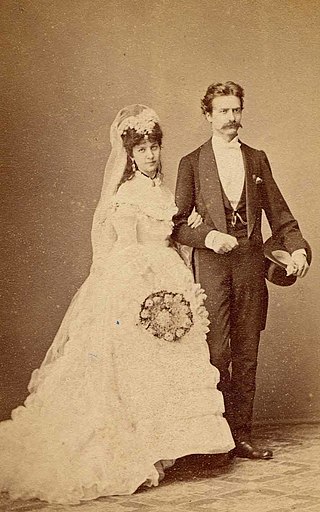
Helgoland, WAB 71, is a secular, patriotic cantata for male choir and orchestra, composed by Anton Bruckner in 1893. Since Bruckner did not complete the 9th symphony, Helgoland is his last complete work.

Germanenzug is a secular, patriotic cantata composed in 1863–1864 by Anton Bruckner on a text by August Silberstein.

The Two Aequali, WAB 114 & WAB 149, were composed by Anton Bruckner in 1847.

Ave Regina caelorum, WAB 8, is a motet composed by Anton Bruckner in c. 1886.

Zur Vermählungsfeier, WAB 54, is a wedding song composed by Anton Bruckner on 27 November 1878.

Nachruf ("Obituary"), WAB 81a, is a song composed by Anton Bruckner in 1877 in memory of Joseph Seiberl. The song is better known as its 1886 reissue as Trösterin Musik, WAB 81b.

The Volkslied, WAB 94, is a patriotic song composed by Anton Bruckner in 1882 for a competition for a Hymne für das Deutsche Volk in Österreich.

Abendzauber, WAB 57, is a song composed by Anton Bruckner in 1878.

Um Mitternacht, WAB 90, is a song composed by Anton Bruckner in 1886 on a text of Robert Prutz. About twenty years earlier Bruckner had already composed a song on the same text.

Mitternacht (Midnight), WAB 80, is a song composed by Anton Bruckner in 1869.

Der Abendhimmel, WAB 55, is a song composed by Anton Bruckner in 1862.

Der Abendhimmel, WAB 56, is a song composed by Anton Bruckner in 1866. It is the second setting of the work. In 1862, Bruckner had already composed a first setting of the song for men's voice quartet.

"An dem Feste", WAB 59a, is a song composed by the 19-year-old Anton Bruckner in 1843 during his stay as schoolteacher's assistant in Kronstorf. In 1893, near the end of his life, Bruckner modified slightly its music score and let Karl Ptak put another text on the song, with as title "Tafellied", WAB 59c.

Das Lied vom deutschen Vaterland, WAB 78, is a patriotic song composed by Anton Bruckner in c. 1845 during his stay in St. Florian.

Das edle Herz, WAB 66, is a song composed by Anton Bruckner in December 1857 during his stay in Linz. During his stay in St. Florian, Bruckner had already composed a first setting of the song for men's choir, WAB 65.

Vaterlandslied, WAB 92, is a patriotic song composed by Anton Bruckner during his stay in Linz.

Vaterländisch Weinlied, WAB 91, is a song composed by Anton Bruckner in 1866 during his stay in Linz.

Herbstkummer, WAB 72 is a lied composed by Anton Bruckner in 1864.


















